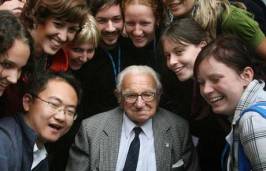Seventy years ago they rode in silence, travelling on trains from Prague not knowing if they would ever see their parents and siblings again. None of them did.
But by virtue of the foresight, humanity and sheer bloody-mindedness of a young British stockbroking clerk called Nicholas Winton, 669 Jewish children were saved from the clutches of the Nazis.
On Friday, 22 of them were reunited with their 100-year-old saviour – now Sir Nicholas – who has come to be known as the ‘British Schindler’.
A steam engine specially requisitioned to re-enact the last stage of their journey pulled into the very same platform at Liverpool Station in London, where as virtual orphans they had disembarked in 1939.
The emotional ceremony marked what is likely to be the final chapter in the odyssey begun by Sir Nicholas as a 29-year-old.
He was packing to go skiing just before Christmas in 1938 when he received a call from a friend working in a refugee camp in Nazi-occupied Czechoslovakia.
”Cancel your holiday,” said the friend, Martin Blake. ”I need you in Prague. Don’t bring your skis.”
The young banker was so moved by what he saw that he immediately set about persuading the British authorities to let in refugee children. The response was sluggish.
But after much work by Winton, a Christian whose family had Jewish roots, the paperwork for each child was painstakingly put in order.
Finally the wheels began to move.
Between March and August 1939 eight trains carried 669 children to Britain, who otherwise would probably have perished in the death camps. Fifteen thousand Czechoslovakian children died in the war.
Sir Nicholas, who was knighted in 2002, stepped off the Peppercorn A1 Pacific class steam engine on Friday morning to loud applause from those he had saved, now grey-haired, and their families.
The train had travelled from Harwich in Essex, containing 22 evacuees about 150 other passengers, on the last leg of the 800 mile journey from Prague.
Each survivor was given a moment to talk to Sir Nicholas.
Speaking to the crowd, Sir Nicholas, from Maidenhead, Berks, joked: ”This is much harder work that it was 70 years ago.
”Seventy years ago it was a question of getting a lot of little children together with the families who were going to look after them.
”It all worked out very well and it’s wonderful that it did work out, because after all history could have made it very different.”
He added: ”It’s wonderful to see you all after so many years – don’t leave it quite so long until we meet here again.”
His grandson, Laurence Watson, 21, who recently graduated from Cambridge University with a degree in physics, spoke of his pride at his grandfather’s actions.
He said: ”There has always been bad things going on in the world and there has always been wars and conflicts.
”You see it every day in the newspapers. Very occasionally you meet someone who has read those same articles but who decides to do something about it.
”That’s what my granddad did. He said ‘Something needs doing and I am going to do it’.”
The timing of the reunion contains a sad epitaph, however.
The ninth train, containing 250 children, was due to leave Prague on 3 September 1939, the day Britain declared war.
The Germans never let it leave the station, and most of the children never lived to see 1945.
Almost as remarkable as the scheme itself, and a mark of Sir Nicholas’s modesty, was that he chose to conceal his achievements for decades.
It was only when he wife Greta unearthed a briefcase in the attic contained lists of the children he saved and letters to the parents did he admit his part.
He said in 1999: ”My wife didn’t know about it for 40 years after our marriage, but there are all kinds of things you don’t talk about even with your family.
”Everything that happened before the war actually didn’t feel important in the light of the war itself.”
He also rejected the comparison with Oskar Schindler, who saved about 1,200 Jews in the war, saying unlike the German his actions never put him in danger.

